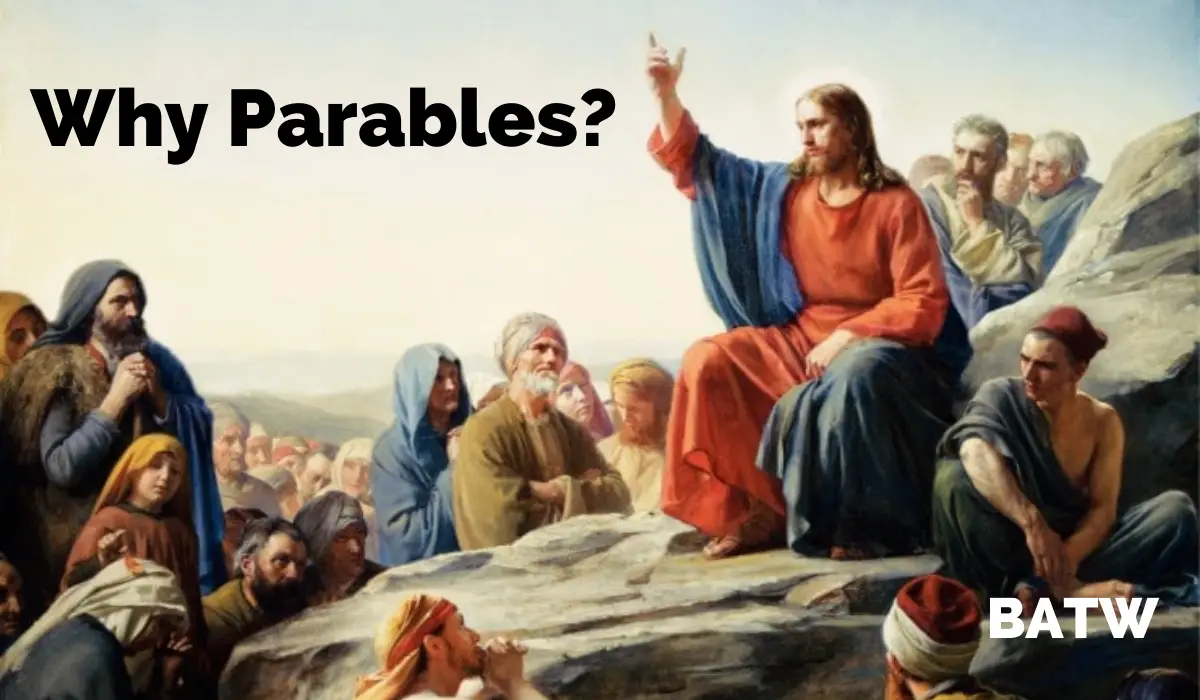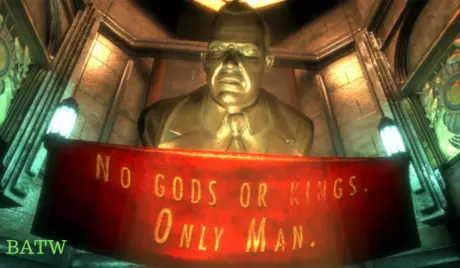Why Did Jesus Use Parables?
Jesus didn’t speak in parables generally, but he did teach in them when he was addressing the people.
In other words, he didn’t speak in parables to his disciples he only spoke in them to the crowds of people who followed him.
Neither did he speak in proverbs at all times.
Elevate your comprehension of parables. Dismiss all the mumbo-jumbo you have heard.
The Holy Bible supplies the biblical definition of a parable read more about that here. Or if you desire to understand what does it mean to speak in parables? Click the link above!
But, today, I desire to explore Jesus’ biblical motivations for speaking in parables.
According to the Bible, Jesus spoke in parables because of four main reasons: wisdom; prophecy; secrecy; and revelation.
The #1 Reason Jesus Teaches in Parables
One of the main reasons Jesus taught in parables was because they revealed the wisdom of God that had been kept secret since the foundation of the world.
In a previous Bible Study, I utilized the Scriptures to show who speaks in parables.
Listen as the Spirit of Christ explains why Jesus speaks in parables. King David was the vessel that the Lord used to communicate this great truth.
“Hear this, all ye people; give ear, all ye inhabitants of the world.”
Psalm 49:1
This was King David speaking but these were not his words. They didn’t originate from him! The Spirit of Christ spoke the wisdom of God through him.
“Both low and high, rich and poor, together.”
Psalm 49:2
What is He Speaking About?
“My mouth shall speak of wisdom; and the meditation of my heart shall be of understanding.”
Psalm 49:3
Who speaks with wisdom but the wise? Jesus communicated the wisdom of God through parables.
The mouth of Jesus Christ utters wisdom. But he didn’t speak any wisdom. He expresses the hidden wisdom of God. How does he accomplish this? By speaking in proverbs to the crowds!
“I will incline mine ear to a parable: I will open my dark saying upon the harp”.
Psalm 49:3
He says I will reveal my parable upon the harp.
This is a prophecy of Jesus Christ. It foretold that God would disclose His hidden wisdom through His Son, Jesus Christ, and that he would use parables and psalms (songs) to achieve this.
Thus, we saw the fulfillment of this prophecy when Jesus taught the general populace in parables (Matthew 13:1-9; Mark 4:1-9 & Luke 8:1-8).
The Second Reason Jesus Speaks in Parables
Why did Jesus speak in parables to the crowds of people?
“All these things spake Jesus unto the multitude in parables; and without a parable spake he not unto them”.
Matthew 13:34
Observe that Jesus spoke to “the multitude in parables” but not to his disciples (Matthew 13:34).
He was addressing the crowds, but his disciples were with him, so, they also heard him teach. But he was addressing the people.
In fact, after he publicly taught the people “in parables” he would privately explain them to his disciples (Matthew 13:18-23).
In one instance, after Jesus sent the “multitude away” his disciples came to him for the explanation of the “parable of the tares of the field” (Matthew 13:36).
Jesus Expounds His Parables To Them!
But on another occasion, Apostle Peter explicitly asked Jesus for an explanation of the proverb he just spoke about.
He said to Jesus, “Declare unto us this parable” (Matthew 15:15).
But why did Jesus speak in parables?
“That it might be fulfilled which was spoken by the prophet, saying, I will open my mouth in parables; I will utter things which have been kept secret from the foundation of the world.”
Matthew 13:35
Therefore, Jesus teaching in parables is a fulfillment of prophecy and a revelation of divine wisdom!
But a divine revelation to whom? Certainly not the people!
What is the Purpose of Parables?
This is a prophecy of Jesus Christ utilizing parables to reveal the hidden wisdom of God to the Church.
Recall, also, that earlier I pointed out that Jesus only taught the people in parables but not his disciples.
Jesus’ disciples were in a position that many righteous people before them desired but didn’t experience.
They craved that understanding of spiritual things that Jesus’ disciples enjoyed but they didn’t attain to it.
Therefore, Jesus explains to his followers,
“For verily I say unto you, That many prophets and righteous men have desired to see those things which ye see, and have not seen them; and to hear those things which ye hear, and have not heard them.
(Matthew 13:17)
But Jesus’ disciples saw and they perceived; they heard and they understood. But they didn’t all understand at first. It’s a process for them and for us!
Jesus had to constantly teach them the “mysteries of the kingdom” after he taught the people (Matthew 13:18; MArk 4:10-14 & Luke 8:9-15).
Consequently, Jesus says of them, “blessed are your eyes, for they see: and your ears, for they hear” (Matthew 13:16).
That is the reason he made the effort to explain regularly his parables privately to them to ensure that the impartation of divine wisdom took place.
How Did Jesus Teaching in Parables Preserve Scriptures?
So, not only did Jesus teach using parables to expose the hidden wisdom of God but to maintain the unbroken nature of the Divine Scriptures.
When Jesus taught in parables he fulfilled the prophecy of Isaiah and this action ensures that the Scriptures remained unbroken.
If he didn’t then the prophecy would not have come true and the Scriptures would be broken. But the Scriptures cannot be broken!
First, let’s hear the prophecy then we shall listen to the fulfillment.
The Lord proclaimed “I will open my dark saying upon the harp” (Psalm 49:3).
In other words, people will sing about this. And indeed, that is exactly what David did. He sang about the dark sayings of God.
His songs (The Book of Psalms) are actually him singing about the wisdom of God.
And he accomplished this while playing his harp. He was skillful with the harp (1 Samuel 16:16, 23).
Again, we go back to David and the Spirit of Christ speaking through him.
However, this is a prophecy of Jesus Christ. David spoke this of him and he accomplished this by teaching the people during his ministry.
“Give ear, O my people, to my law: incline your ears to the words of my mouth” (Psalm 78:1).
Why?
Because “I will open my mouth in a parable: I will utter dark sayings of old” (Psalm 78:2).
“Which we have heard and known, and our fathers have told us” (Psalm 78:3).
Still, there is another prophecy concerning this and it comes from Esaias.
He Reveals Wisdom to One Group & Keeps It From Another
Jesus also speaks in parables to impart the wisdom of God to his followers but hide it from the crowd.
He gave his justification in Matthew 13:10-17.
His disciples noticed that he only taught the people in parables so, they inquired of him why he did that.
They asked him, why do you only speak to the people in proverbs? (Matthew 13:10).
Jesus gave a definite answer to his disciples and it was not in riddles.
So, Jesus also teaches in parables for the benefit of his followers, the Church.
“He answered and said unto them, Because it is given unto you to know the mysteries of the kingdom of heaven, but to them it is not given.”Matthew 13:11
Friends realize that even though it was the disciples’ responsibility “to know the mysteries of the kingdom of heaven” but this knowledge was not automatic for them.
As a Christian, do you know the mysteries of the Kingdom of Heaven? It’s your responsibility to know them!
Why Did Jesus Speak in Parables – His 2-Fold Reason?
Today, many Christians know their responsibilities but they don’t take the correct actions to live up to them.
What Jesus said to his first followers he says to us today too. We must “know the mysteries of the kingdom of heaven” too (Matthew 13:11).
We don’t receive Jesus Christ as our Savior and instantly we know them. Believers must search the Word of God under the guidance of the Holy Ghost to know them.
Thus, Jesus’ teaching in parables had, at least, a two-fold objective.
First, he was educating his disciples, then he was speaking in riddles to the people.
In one breath, he was educating one group, with the wisdom of God, but, simultaneously he was withholding this knowledge from another group.
We should never miss the benefits of the Word of God due to ignorance of it.
For the soul to be without knowledge it is not good (Proverbs 19:2).
As a result, the people of the world will not understand the “dark sayings” of Jesus but his followers will!
One Principle of The Kingdom
The following Scripture-verse serves as a general principle of the Kingdom of Heaven.
“For whosoever hath, to him shall be given, and he shall have more abundance: but whosoever hath not, from him shall be taken away even that he hath”.
(Matthew 13:12)
But, here, in this context of the parables, it speaks particularly to the knowledge of the kingdom.
The more knowledge of the kingdom you receive from the Lord the more He gives to you on this topic.
Conversely, if you are poor in this area you will remain in that despicable state.
Why Did Jesus Speak in Parables to The Jews?
For that reason, the Jews could not and did not understand the parables of Jesus Christ.
For a similar reason as the Jews then, the world and most of Christendom now, do not understand the parables of Jesus Christ.
“Therefore[,] speak I to them in parables: because they seeing see not; and hearing they hear not, neither do they understand”.
(Matthew 13:13)
Thus, they see and hear, but they don’t “understand” the Word of God (Matthew 13:14).
Now, everything that Jesus says or does fulfills a prophecy.
Case in point, his explanations above to his disciples fulfills the prophecy of Isaiah, (Isaiah 6:9-10).
All of Jesus’ speech or actions preserve the unbroken nature of the Divine Scriptures.
None of his actions or speech contradicts the Bible. They all agree with the Word!
“And in them is fulfilled the prophecy of Esaias, which saith, By hearing ye shall hear, and shall not understand; and seeing ye shall see, and shall not perceive” (Matthew 13:14).
“For this people’s heart is waxed gross, and their ears are dull of hearing, and their eyes they have closed; lest at any time they should see with their eyes and hear with their ears, and should understand with their heart, and should be converted, and I should heal them” (Matthew 13:15).
This Only Happens If You Are A Believer!
“But blessed are your eyes, for they see: and your ears, for they hear.”
Matthew 13:16
“For verily I say unto you, That many prophets and righteous men have desired to see those things which ye see, and have not seen them; and to hear those things which ye hear, and have not heard them.”(Matthew 13:17)
Therefore, another of the major reasons Jesus speaks in parables is to accomplish and maintain the unbroken nature of the Divine Scriptures.
Thus, Jesus teaching in parables enables the fulfillment of prophecy and facilitates the actualization of the Word of God.
Conclusion
So, to answer your question: why did Jesus speak in parables? He spoke in parable to reveal to His Church the wisdom of God that had been locked away for millenniums.
Jesus taught in proverbs to educate his Church concerning the “mysteries of the kingdom of heaven”.
Through millions of years, many righteous people desired to know the mind of God but they didn’t.
So, when Jesus came on the scene he employed speaking in parables to dispense the wisdom of God and unlock His wisdom that was secured.
While Jesus by speaking in parables explains the “mysteries of the kingdom of heaven” to his Church, but the said action ensures that the unbelieving world remains in ignorance of the same subject.
In so doing, the Son of God fulfilled the prophecies of God concerning the Word of God.


